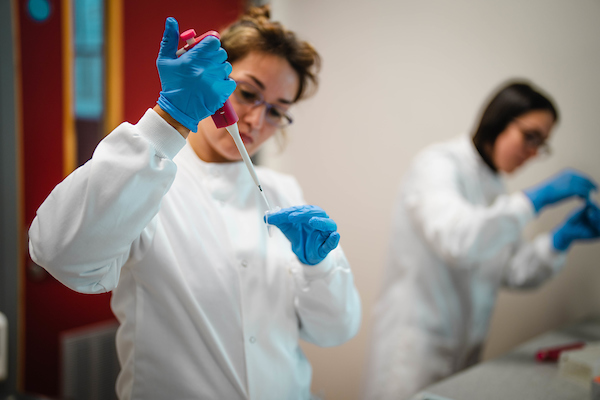
University of Bolton, Deane Road, Bolton. BL3 5AB
Tel:
Email:


“At the University of Bolton, we take great pride in providing a quality, supportive learning environment for our students.”
Professor George E Holmes DL | President & Vice Chancellor
“...tutors are very supportive and you’re not just a student ID number, at this university you are an individual with a name.”
Ellisse Vernon | BSc (Hons) Adult Nursing
Back to menu
Back to menu
Study with an Off-Campus Partner
Back to menu
Back to menu
University of Bolton, why we are the right choice
Location - Bolton, Greater Manchester

24/01/2023
In today’s world, is it possible to create a medicine that is 100% effective?
Due to the risks associated with illnesses and treatments, this is something that is rare to see; but researchers may have just found a way of making this possible. Research suggests that a fully effective mRNA vaccine has been developed to protect people against a form of deadly bacteria that is lethal to humans.
This revolutionary work couldn’t be possible without biomedical scientists. This blog explores the definition of biomedical science, what the life of a biomedical scientist looks like, and how you can start a journey that will help you contribute to saving lives with a degree in biomedical science.
What is Biomedical Science?
How would you feel about playing a role in discovering the next ground-breaking development in cancer treatment or identifying the warning signs of the next global pandemic? This could be a reality by pursuing a biomedical science career as 70% of NHS diagnoses are often based on pathology results provided by a laboratory.
If you’re interested in modern medicine, then biomedical science could be the ideal career for you. This is because, biomedical science is one of the broadest areas of modern science that underpins new medicine; from determining the blood requirements of critically ill patients to identifying outbreaks of infectious diseases and monitoring biomarkers in cancer.
The Life of a Biomedical Scientist
Now that you have a better understanding of what biomedical science is, you might be interested to hear what the day in the life of a biomedical scientist looks like. In a nutshell, a scientist would conduct laboratory and scientific tests to support the diagnosis and treatment of diseases. Typical responsibilities could be, but are not limited to:
- Playing a key role in running healthcare laboratories, A&E, operating theatres, other hospital departments
- Investigating clinical conditions including blood disorders, cancer, hepatitis, and meningitis. Biomedical scientists are crucial to providing results that are critical to patient care
- Within the NHS Blood and Transplant Service, biomedical scientists are important to ensuring blood, tissue, and organ safety for patients
- Working with computers, automated equipment, microscopes, and other laboratory instruments

How to Become a Biomedical Scientist
Did you know that biomedical scientists handle over 150 million UK samples each year? This means that at some point in our lives, almost all of us will have benefited from the services of a biomedical scientist.
This means that there’s no better career path to pursue if you have a passion for science and you want to make a difference to the global healthcare industry. But how can you start your journey? This is where the University of Bolton can help with the new degree in biomedical science.
By providing a supportive learning environment that gives you a thorough understanding of human biology from a medical perspective, we will give students a 360-degree learning experience; from exploring the causes of diseases to exploring the methods and technologies used to treat them. Students gain access to high-spec facilities that mimic the industry environment, giving them the hands-on experience supported by experienced lecturers to boost their clinical skills and become more employable.
As a biomedical science student, you will be based in our multi-million-pound Queen’s Specialist Building, which in addition to high-spec laboratories, offers modern classroom teaching facilities including a microscopy facility, a microbiology laboratory, and a tissue engineering suite, all dedicated to undergraduate learning, Additionally, students gain access to the £31 million Bolton One building for their anatomy and physiology classes. This is because Bolton One is home to spacious clinics for learning anatomy and a well-equipped physiology laboratory.
Want to become the next great biomedical scientist? Start your journey with the support of #UniAsItShouldBe by clicking to see our full course details.
For more information, please contact us at enquiries@bolton.ac.uk or call us on 01204 903903.